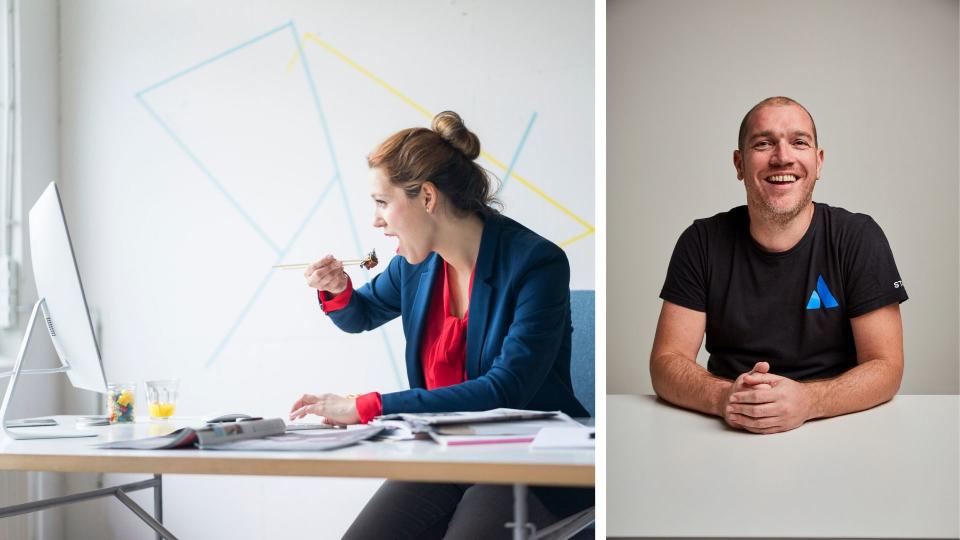‘Bulls**t habits’ you need to quit to survive the future of work

Atlassian futurist Dom Price has a bone to pick with modern workplaces.
Related story: Atlassian gives employees free breakfast, lunch, alcohol, but NO coffee
Related story: Inside Atlassian’s huge remote work plan
Related story: Atlassian to tie staff bonuses to ‘no bulls**t’ approach to job
Futurist at $50 billion tech giant, Atlassian, Price believes the current nine-to-five, bums on seats, punching the clock office is a relic of a bygone era.
And it’s time to get with the program.
“We can work from anywhere, and we can operate at different times,” he told Yahoo Finance.
“I am rewarded and recognised for my creativity, my curiosity and my energy and experimentation. And that doesn't always occur nine to five Monday to Friday.”
The nine to five approach to work is one of many workplace relics that Price and Atlassian want Australians to reconsider.
Atlassian released a Chrome extension on Monday with this in mind. Dubbed ‘Daily Unlearnings’, Atlassian describes the extension as a way to remember “bullsh*t habits” and discover new ways to work.
These could be as simple as considering whether you need to attend that meeting, or if you’re just going by default.
How to get your boss to say 'yes' to a flexible working arrangement
Workplace flexibility is no longer a perk, it’s a requirement
For Price, the reminder to only accept necessary meetings is a crucial one: he cancelled all his meetings in early 2018, discovering that only a third of the cancelled meetings landed back in his inbox a few days later.
The extension also serves up reminders to not act like you know everything, and always be open to learning. And today’s reminder is for everyone to meet and learn about new hires.
The idea is that they’re simple, actionable things that workers can incorporate into their days, Price said.
“Each of these actions, you don't really need approval for sign off, you probably don't need to tell your boss,” he said.
“It’s about you deciding that if you want to work in an amazing work environment, it starts with you. And if you can take action, you become a role model to all those people around you so that they can become a force multiplier.”
A small step towards the future of work

The extension represents a bigger question Atlassian is grappling with: what does the future of work look like, and how will contemporary businesses and workers learn to adapt?
The Society for Human Resources Management has classed communication, the ability to deal with complexity and ambiguity, and problem solving and creativity as the top three “missing soft skills”.
But Price would also add collaboration, wellbeing and flexibility.
“The scary part about today is the average kid going through school now is still taught that talking to the person during the test is cheating, but when they join my organisation, I call that collaboration,” Price said.
“That very, very first task is to teach people that working together is a good thing, not a bad thing.”
When it comes to flexibility and wellbeing, Price is quick to note that that doesn’t mean a few bean bags and a ping pong table, or a work from home policy that’s only in place from Tuesday to Thursday.
Rather, modern flexibility is an understanding of the way workers work - and that flexibility might mean working late into the night from home and dialling in to the meeting the next day.
Flexibility also means accepting that workers may need to take months off at a time to retrain for future tasks. That might see a hit to productivity, as it’s traditionally measured, but the long-term benefits of a continually upskilling workforce are huge.
“A lot of organisations aren’t playing the long game. They're playing a very short game where they want quarterly
or daily productivity, and yet [we’ve started] investing in ourselves, our purpose, the planet, the people around us. And that's different to just profit and productivity.
“I think that our mindsets are starting to evolve to say, ‘I'm really on this planet for a long time. I might as well enjoy it while I'm here,’ and that should be a combination of many things.”
Make your money work with Yahoo Finance’s daily newsletter. Sign up here and stay on top of the latest money, news and tech news.

 Yahoo Finance
Yahoo Finance 
